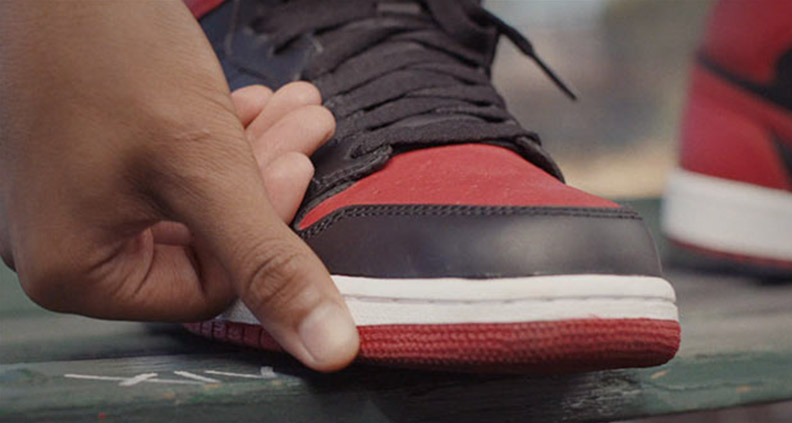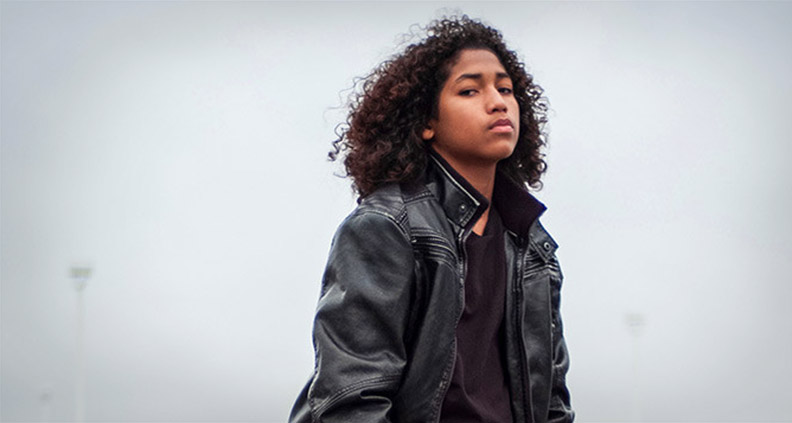Kicks premiered at the 2016 Tribeca Film Festival and has steadily been making the festival rounds, including an appearance at our very own LA Film Festival. But even if you missed it in June, Angelinos will have another chance to catch the movie Thursday, September 1 for free at LACMA’s Bing Theater—click here for more info, including ticket reservations. The evening will also include a post-screening Q&A with Tipping and actor C.J. Wallace, who plays “Albert” in the film.
Filmed in on location in authentic East Bay neighborhoods from Richmond to Oakland, Kicks features a diverse cast of both professional and non-professional actors, creating a film that’s at once deeply personal yet completely universal, exploring deep themes of masculinity, adolescence and violence without sacrificing entertainment value. The film opens in theaters next Friday, September 9. Film Independent recently spoke to Tipping and Kicks co-writer and producer Joshua Beirne-Golden about the movie, the importance of shooting on location, the process of assembling their unique cast and more. Here’s the conversation: So to tell me a little about Kicks. What’s this movie about? Tipping: Kicks is a coming-of-age story, kind of this teenage odyssey about this kid who thinks his life is going to change when he gets a new pair of Jordans. And when he does get them, they get taken. It’s about him and his two friends going across the East Bay and trying to get them back. Justin, I read that the story was inspired by an actual incident from your childhood. Could you describe what happened? Tipping: Yeah, definitely. I was 16. I’d just gotten these custom Nikes and I thought I was very cool—they had my name engraved on the side. I remember approaching a group of about 10 kids and the first thing I heard was “he’s got the Prestos!” I just knew I was about to get jumped, and I did. My older brother tried to console me and said, “It’s okay. You’re a man now.” That moment made me proud as this sort of right of passage, but also very sad. Because in retrospect it made me think, why is violence always associated with talking about being a man and masculinity? That’s what sparked the idea. Josh, how did you seize on this incident as the kernel of a movie you would eventually collaborate on together? Beirne-Golden: We actually met on the very first day of school in film school at the American Film Institute in 2009. You come in with two ideas on your very first day at AFI and one of Justin’s two ideas was Kicks. From that day forward it was a project we always talked about developing as a feature. We were both really drawn to teenage coming-of-age stories with that epic feeling, and we both liked the idea of a movie centered around this really specific place and this really specific thing. What are some examples of coming-of-age movies that inspired you two while you were putting the film together? Tipping: Stand By Me, The Goonies… that’s kind of where the structure started, at least. And of course I also grew up watching Juice and Boyz N the Hood, but obviously those are kind of older stories and I was more interested in that earlier phase, when you’re still teetering between being a boy and being a man and being forced to be a man even when you’re not ready. Without spoiling anything, what does that correlation between masculinity and violence mean to you now that you’ve explored those ideas through film? Tipping: It really comes down to how you start to talk to the youth about what it means to be a man from an early age. Changing that narrative is really important to help end that cycle of violence. Because one of the emotions you’re allowed to express [as a young male] is anger. But why isn’t the phrase “man-up” associated with learning how to walk away? That’s not part of the dialogue. Solving this problem boils down to how quickly we reach the youth and start redefining what those ideas are in our society. Apart from the autobiographical aspect of setting the film in the East Bay, what is it about that area that interests you as filmmakers? Beirne-Golden: A lot of the time—particularly in independent film but also in film across the board—you tend to see the same places and the same types of stories. We felt that in addition to being very personal, [the East Bay] was also a world that didn’t feel over-shot. We definitely had to make some sacrifices to be able to shoot there, but it was really important to us. And it was a really interesting opportunity to see a major city in a way that we hopefully haven’t seen before. I was trying to think of other East Bay movies and all I could come up with was Fruitvale Station. Beirne-Golden: Yeah, Fruitvale is always the one that gets tossed around. Tipping: [laughs] They pretended to shoot [Paramount’s 2005 Richmond-set basketball drama] Coach Carter there, but they shot it all in Long Beach. My friends and I don’t really consider that a real depiction of the East Bay. You guys tapped a lot of nonprofessional acting talent for the film. Tell me about the process of finding your cast and especially Jahking Guillory, who plays the lead, Brandon. Tipping: Because it was such a specific world I knew we were going to have to hit on all cylinders. We had a casting director in Los Angeles, Kim Hardin, who also worked on Hustle & Flow and who was working with John Singleton. That was how we found Jahking, Chris Meyer and Christopher Jordan Wallace, the three main kids. And they all had very little or no experience. We started hitting up every youth group that we possibly could in Richmond and Oakland and San Francisco. I was even street teaming, literally going and finding kids and asking them to come in and be on tape. So everyone else in the movie is actually someone we ran into or discovered in a very organic way. The film played at the 2016 LA Film Festival earlier this year. What was that experience like? Tipping: Oh, it was great [laughs]. One of the first things we were both excited to go and do when we first moves to LA was go to the LA Film Festival. In fact, when we met David Kaplan, who was our other producer who put a lot of the financing for the movie together, we met at the LA Film Festival and saw Short Term 12. That was what really sealed the deal for us in working with him, so it was very cool to have it come full circle in that way. Kicks is playing for Film Independent Members at LACMA Thursday. Is there anything you look forward to talking about during the Q&A? Tipping: I look forward to hearing people’s reactions, because we definitely know where we wanted to go with [the film] and how we wanted to wrap it up, and it’s always interesting to hear the discussion afterwards. I’d say bring every question you could possibly ask about the film—that’s part of what excites us about film. Lastly, what kind of shoes are each of you wearing right now? Tipping: [laughs] I’m wearing, like, the Nike Lab4. The retro Jordans. Beirne-Golden: I’m wearing Vans. Like, leopard-print Vans. Kicks opens in theaters Friday, September 9. For more, please visit the film’s website or Facebook page. For more information about how to attend this Thursday’s (free!) screening of the film at LACMA, click here. To learn more about Film Independent, subscribe to our YouTube channel or follow us on Twitter and Facebook. To learn how to become a Member of Film Independent, just click here.

